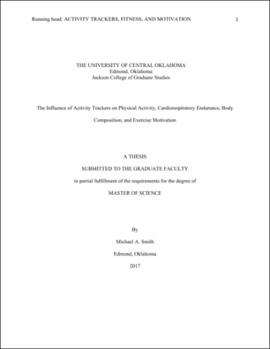| dc.description.abstract | The purpose of this research was to examine the influence of activity trackers on physical activity (PA), cardiorespiratory endurance (CRE), body fat percentage (BF%), and exercise motivation. With wearable technology being named as the number one fitness trend for 2016 and 2017 (Thompson, 2015, 2016), activity trackers may be an effective tool to increase physical activity, increase CRE, decrease BF%, and improve exercise motivation. Forty-eight healthy volunteer participants ages 18-72 who did not achieve more than 3000 metabolic equivalent of task (MET) minutes per week of physical activity (PA) were recruited to participate in a 12-week walking intervention. Participants were given the International Physical Activity Questionnaire (IPAQ), exercise motivation inventory (EMI-2) survey, tested for anthropometric measures, and tested for CRE at baseline and final testing. Participants were divided into an activity tracker group and a control group. Analyses revealed no significant differences between the treatment and control groups for PA, CRE, BF%, or motivation from baseline to final testing. There were significant improvements in PA measured by the IPAQ for both groups from baseline to final testing, F (2, 64) = 17.374, p = .000; however, step counts did not improve for either group from baseline to final testing. There were significant improvements in CRE for both groups from baseline to final testing, F (1, 29) = 13.016, p = .001. Analyses revealed that the walking program may have been effective for improving PA and CRE, but that activity trackers did not provide any additional benefits. The conclusion is that activity trackers alone may not be an effective tool for the improvement of PA, CRE, BF%, or motivation. | |
